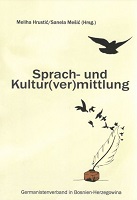ICH WEIẞ NICHT und NE ZNAM: Über direkte Vermittlung von Nicht-Wissen hinaus
ICH WEIẞ NICHT and NE ZNAM: beyond conveying lack of knowledge
Author(s): Minka Džanko
Subject(s): Theoretical Linguistics, Communication studies, Pragmatics, Phraseology
Published by: Društvo germanista u Bosni i Hercegovini (DGuBiH) / Germanistenverband in Bosnien-Herzegowina (GViBH)
Keywords: language; knowledge; "I don't know"; communication;
Summary/Abstract: The use of I DON’T KNOW in informal and institutional face-to-face and telephone conversations has been researched in German (Bergmann 2017; Helmer/Reineke/Deppermann 2016; Helmer/Depppermann 2017) and numerous other languages (Aijmer 2009; Beach/Metzger 1997; Keevallik 2006; Weatherall 2013). Depending on it’s formal aspects such as syntactic and phonetic reduction, the turn position and it’s orientation (retrospective or prospective), I DON’T KNOW has been associated with numerous functions beyond expressing lack of knowledge. This paper deals with ICH WEIẞ NICHT and NE ZNAM in German and Bosnian doctor-patient-interaction. It focusses on the sequential and interactional use of these phrases by German and Bosnian patients. The analysis reveals that both phrases are used as epistemic and pragmatic markers. In contrast to the German data, the Bosnian phrase NE ZNAM appears as a stand-alone answer to a medical question and indicates complete lack of knowledge. My research draws on interactional data consisting of 29 German medical conversations as well as 28 Bosnian medical encounters. The data was examined and compared by using conversation analysis.
Book: Sprach- und Kultur(ver)mittlung
- Page Range: 49-67
- Page Count: 19
- Publication Year: 2022
- Language: German
- Content File-PDF

